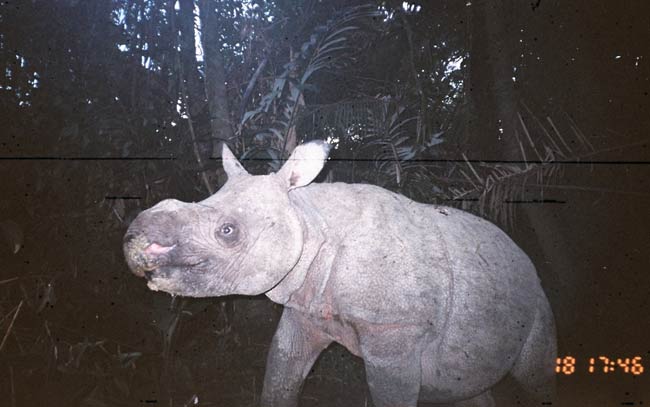
Extremely Rare Rhino Captured on Video

Javan rhinos — possibly the rarest mammal on the planet — have been spotted by a motion-activated video camera in Indonesia.
The footage of the rare beasts, seen wandering with their young through a dense tropical rain forest in the southeastern Asian island nation, is giving hope to scientists that the critically endangered species is breeding and might be saved from extinction.
"There are no Javan rhinos in captivity — if we lose the population in the wild, we've lost them all," said Eric Dinerstein, a chief scientist at conservation organization WWF, which partnered with Indonesian national park authorities to release the video of the rhino families.
However, Dinerstein warned that the survival of the species is still far from certain. As few as 40 Javan rhinos are thought to exist on Earth.
Once numerous throughout Southeast Asia, the rhino's population is now likely isolated to Ujung Kulon National Park in Indonesia. This small population size makes the rhino extremely vulnerable to any threat, including poaching for its horn, which is traditionally believed to have medicinal properties.
The first video, recorded in November, shows a mother and male calf walking steadily toward the video trap, munching leaves. At one point the calf turns away from the camera and wags its tail to swat a fly.
The second family made its debut in December in a 30-second video that shows a larger female calf, approximately a year old, walking with her mother.
Sign up for the Live Science daily newsletter now
Get the world’s most fascinating discoveries delivered straight to your inbox.
WWF scientists pointed to the rebound of another critically endangered rhino as an encouraging sign for the Javan species.
"The recovery of the white rhino in South Africa is the most successful example of international wildlife conservation for a highly endangered species," said Dinerstein, who is a rhino biologist. "With less than 50 left in a single reserve in 1900, there are currently around 20,000 alive in nine countries," Dinerstein said.
"Fifty years of conservation experience has taught us that saving Javan rhinos is possible through population management and proper protection," said Barney Long, head of Asian species conservation at WWF.
Several rhino conservation groups, including WWF, are working with Ujung Kulon National Park authorities to protect the species from poaching, monitor the remaining Javan rhinos, and establish a new population by relocating several individuals.
Reach Andrea Mustain at amustain@techmedianetwork.com. Follow her on Twitter @AndreaMustain.
This article was provided by OurAmazingPlanet, a sister site to LiveScience.










